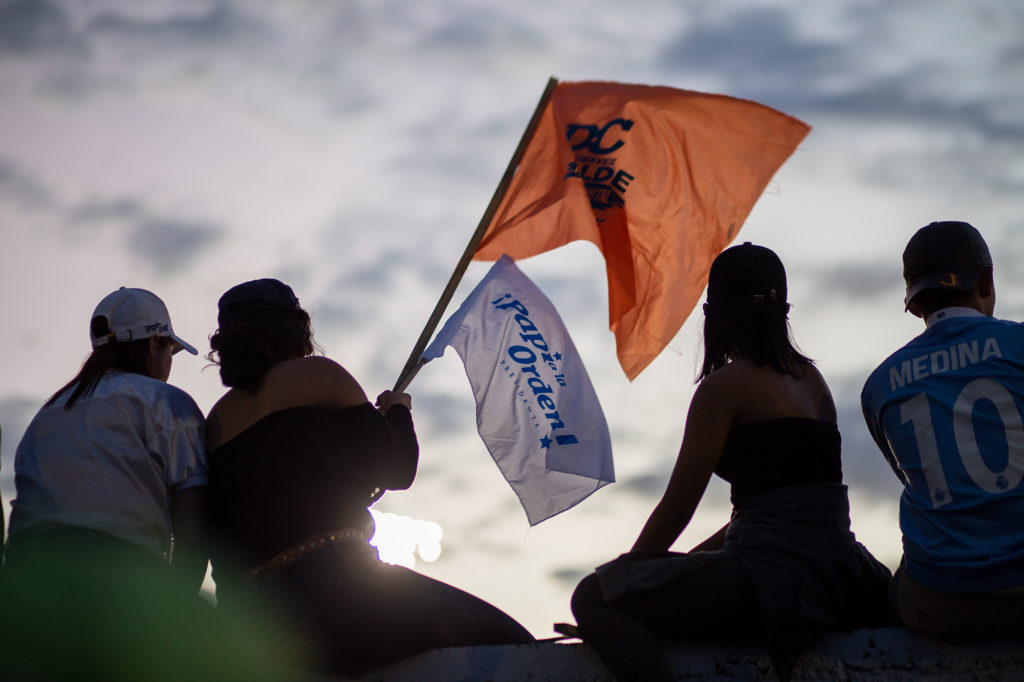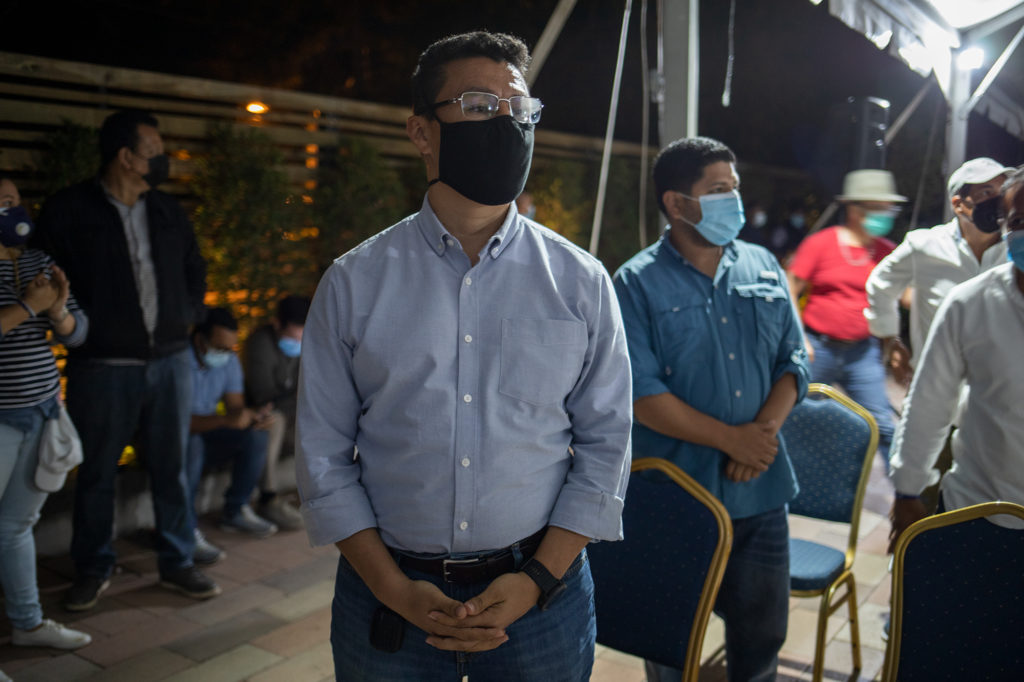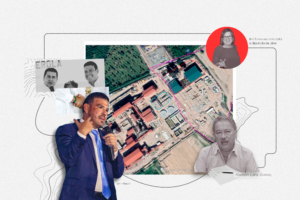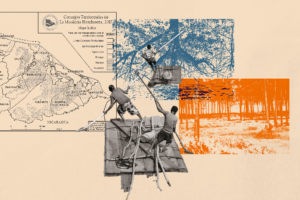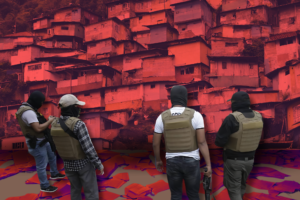Xiomara Castro’s victory on November 28 swept many entrenched politicians out of office and toppled the two parties that have held onto power for decades through shady political deal making. Business leaders who have benefitted from the policies of previous governments now face an uncertain future, as the incoming administration has promised to repeal or revise some of these policies. However, other political and business sectors that opposed the current administration are now hoping for real change.
By Fernando Silva
Photos by Martín Cálix
The National Party had a big celebration planned for election night in its bunker-like headquarters. The party’s top leaders were going to gather there and wait for the National Electoral Council’s (Consejo Nacional Electoral – CNE) announcement of the preliminary election results that would either preserve the party’s political and business dominance or change the game by ushering in a new government that has criticized many of the laws and deals made by National Party governments over the last decade.
More than a week after the announcement of those preliminary results, Xiomara Castro of the Liberty and Refoundation Party (Libertad y Refundación – Libre) has been widely acknowledged within Honduras and by the international community as the country’s next president. However, neither the presidential candidate, Nasry Asfura, nor the president of the National Party and candidate for mayor of Tegucigalpa, David Chavez, appeared in public on election night to acknowledge the preliminary results. Much of the National Party’s old guard was resoundingly defeated at the polls, and their private-sector allies anxiously await the incoming administration’s stance on Employment and Economic Development Zones (ZEDEs), the Public-Private Alliance Program, and the power generation contracts that have exclusively benefited private businesses.
Read: Massive voter turnout and a vote for Xiomara Castro turns the tide in Honduras
Businesses with close government ties face an uncertain future
“Foreign and domestic investors are unsure about what’s going to happen with their businesses. This is very different from what would have happened if Nasry Asfura had been elected to the presidency. An Asfura victory would have brought in more foreign investment. I’m concerned because the rhetoric from the president-elect and her party rejects investment and job creation, particularly regarding the ZEDEs,” said Miguel Farach, a presidential commissioner for the Gulf of Fonseca region and a National Party candidate for Congress from the Department of Choluteca.
Although Farach’s political career spans over 20 years, he received the fewest votes of any National Party candidate in Choluteca. Juan Oliva, the National Party candidate who garnered the most votes in Choluteca, was running for office for the first time. Farach will now fall back on his business career, which is why he adamantly argues that the whole country, and especially southern Honduras, is concerned about the investments made over the last eight years during the Hernández administration.
Farach says private companies that have business deals with the current administration don’t know how they will fare under the new government because “their socialist ideology will be a radical change for us.” The rhetoric from the incoming administration “has been hostile to domestic and international investment,” Farach said.
The ZEDEs could be some of the first business ventures addressed by the new administration. The Orchid ZEDE, a special agro-industrial zone with greenhouses for cultivating export-quality chili peppers and tomatoes, is already operating in the municipality of San Marcos de Colón in Choluteca.
Read: Fiction and reality with economic zones in southern Honduras
Xiomara Castro and the other Libre Party candidates stated on multiple occasions during their campaigns that they would eliminate the ZEDEs, which would require action by the National Congress, a real possibility if Libre wins a majority there. Ricardo Lardizabal, one of the partners in the Orchid ZEDE, admits concern about the National Congress repealing the ZEDE law. “We made a big investment,” says Lardizabal, “and 80% of it is borrowed money. We’re already producing and exporting our products, which is what our country needs; jobs and revenue. But we just have to wait and see what our new leaders will do. It’s up to them to decide if they want to keep these companies going.”
The ZEDEs are areas in Honduras governed by a special regime that allows investors to establish their own fiscal policies, security forces, judicial systems, and other capabilities. Some argue that the ZEDEs violate principles of national sovereignty.
Ricardo Lardizabal, the son of a well-known businessperson and National Party politician, argues that while the Orchid ZEDE does benefit from certain exemptions, the surrounding communities also benefit from the municipal taxes it pays and the more than 800 jobs it provides. Lardizabal says that he and his business partner, Victor Wilson, a well-known local businessperson and political power broker, have asked for a meeting with the commission appointed by the president-elect, but have been asked to wait.
“The Honduran people determined who they think is the right person to lead the country forward, so let’s hope she is up to the task. We’re unsure about how they’re going to change the rules and foresee some problems, but I think we contribute positively to the country. I realize that they’re going to impose some restrictions on us, but I don’t think they’ll make us stop production,” Lardizabal said.
Another ZEDE initiated before Castro’s election is the Próspera ZEDE located in Roatán, Bay Islands, which issued a statement saying, “We believe in the importance of engaging in a broad and transparent conversation about special economic zones such as Próspera. We recognize that there are areas of improvement that will make Hondurans more comfortable [with ZEDEs], while also providing greater legal stability, which is indispensable for attracting investment to the country.”
Contracorriente contacted Erick Brimen, president of the Próspera ZEDE’s Executive Council, for an interview regarding Castro’s election. Bremen replied that he was not available for an interview, but said he considered the rapprochement between the president-elect’s commission and the Honduran Council of Private Enterprise (Consejo Hondureño de la Empresa Privada – COHEP) to be a positive step. He also hopes this type of dialogue “will result in policies that make the country more competitive and promote legal stability for all types of investment.” One of the first meetings held by the president-elect’s team was with COHEP representatives on November 30.
Eduardo Facussé, president of the Cortés Chamber of Industry and Commerce (CCIC), told Contracorriente that despite some differences with the president-elect, they have already agreed to work closely together to make her administration a success. Facussé notes that private-sector organizations opposed the ZEDEs from the beginning, and he regrets that some ignored COHEP’s recommendations and decided to invest in them anyway.
“What we recommend is that these investments [in ZEDEs] be folded into one of the other existing exemption regimes,” Facussé said. “For example, we have a free zone regime that probably provides most of the functions or incentives that investors are seeking. It’s not about dismantling the investment, it’s about finding an appropriate regime that’s compatible with Honduran law.”
Facussé mentions other government business dealings that need to be looked at, citing the renewable energy generation contracts that represent a large percentage of the National Electrical Energy Company’s (ENEE) debt, saying that [these contracts] have dug a deep hole from which it’s very difficult to escape.
The contracts mentioned by Facussé came about through an executive decree by former President Manuel Zelaya, Xiomara Castro’s husband, that approved the Law for Renewable Energy Promotion (Ley de Promoción a la Generación de Energía Eléctrica con Recursos Renovables). This law authorizes the direct purchase of energy with no requirement for a competitive bidding process and provides incentives for power generation companies. More than 200 contracts had been signed with private power generation companies through 2020, yet less than half are generating electricity today.
Fourteen years after the law was enacted, a large percentage of ENEE’s debt is due to these lucrative contracts that increased electricity rates for consumers and did nothing for the approximately 1.6 million Hondurans without electricity.
Read (in Spanish): ENEE’s big renewable energy scam
Regarding these detrimental contracts and businesses that violate the law, Pedro Barquero, coordinator of the Savior of Honduras Party (Partido Salvador de Honduras) which allied with Libre to win the elections, said in an interview that legal stability cannot be used as an excuse to cover up corruption. He stressed that Xiomara Castro’s instructions are to review the contracts in order to establish new terms that are beneficial for the public and the country as a whole.
“These contracts are very lucrative for the concessionaires and there’s no reason why the government should have to guarantee a minimum level of revenue for them ─ there’s no way they can lose money,” said Barquero.
“So the Honduran people and our government get the brunt of it, and that’s not fair. The objective of the [contract] review is to find ways of renegotiating terms that are more aligned with public benefit rather than private interests,” he said.
The government will also have to deal with prejudicial or unnecessary trusts, such as the one to build and manage the Government Civic Center, which now houses various government agencies, or detrimental Public-Private Alliance contracts such as the concession granted to the EMCO consortium led by businessperson Lenir Pérez to build and operate the new Palmerola airport. The final cost of building the airport amounted to US$209.3 million; almost US$50 million more than the initially stipulated cost to the government.
Miguel Farach is convinced that the business sector will adopt a conservative posture during the first six months of the Castro administration, as it holds onto its money and waits for clarity on their investment prospects. He mentions the possibility of international lawsuits if contracts are not honored, and believes that the incoming government’s pursuit of popularity may lead it to take extreme measures, even expropriation.
Farach said, “There could be expropriations because some companies are already operating. If it [the incoming government] can’t reach agreements with these domestic and foreign investors, it may nationalize the businesses. Believe me, that’s the mood right now, and we expect them to do just about anything during the first six months to gain popularity, measures that could be catastrophic for the Honduran economy.”
The leaders who favored businesses
Eduardo Facussé doesn’t believe that the November 28 elections were about deciding between the competing ideologies of Xiomara Castro and Nasry Asfura. He believes that Hondurans mainly voted to oust the current government because of its mismanagement and that the Hernández administration miscalculated when it distanced itself from private sector organizations.
“We have direct lines of communication now,” said Facussé, explaining that, “The best thing that can happen is an open dialogue, which was precisely what was missing with the outgoing administration. During my time heading up the Chamber of Commerce, Juan Orlando Hernández didn’t visit us once in four years. It was a serious mistake [for them] to deal directly with individuals instead of working through the institutional framework. That should be a lesson for all of us─ you can’t deal with the problems of an entire sector through a single friend or group.” Facussé thinks that the government lost credibility by doing so.
In light of its overwhelming defeat, María Antonieta Mejía, a National Party candidate for Congress representing the department of Francisco Morazán, believes that as the most conservative institution in Honduran politics, her party needs “a complete reengineering.”
Mejía said, “We demand the removal of people─ bad citizens and bad party members─ who wrap themselves in the National Party flag, commit illegal acts and damage our reputation. I think that the people voted to punish these National Party members and we now have to pay the consequences of the mistakes made by the incumbents. You have to take responsibility and admit when you’re wrong.”
If the current trend in the vote count reported by the CNE continues, this would be the largest margin of defeat suffered by a political party in Honduras since the period of democracy that began in 1982. Furthermore, the expected losses of National Party seats in the National Congress mean that it would become a minority party.
Although the vote tallies are still incomplete, Mejía, who is projected to win her seat, denounced Ebal Díaz, a former minister who is allegedly perpetrating voter fraud to win a seat in the National Congress. Other candidates for congress like Renan Inestroza and Waleska Zelaya joined Mejía in denouncing Díaz, illustrating the power struggle taking place in the National Party.
Read (in Spanish): Political parties taint the electoral process as votes are counted for Congressional seats
Mejía says the people perpetrating vote fraud need to leave the party, but is careful not to speculate about any involvement by top party leaders in the alleged fraud. Nor does she attribute the party’s defeat to allegations of President Hernández’s involvement in drug trafficking. She believes that government mismanagement during national crises led to their failure.
“Some will argue that it was the allegations against the president,” said Mejía, “but we have undeniable evidence of hospitals acquired by the government to combat the pandemic that never worked, and of hurricane damage that was never remedied.”
Before the pandemic and hurricanes Eta and Iota, the country’s poverty was already at an alarming level. According to data from the National Autonomous University of Honduras (UNAH), 59.3% of the population lived in poverty in 2019. In 2020, the poverty rate rose to 70% and could increase to 75% in 2021, according to estimates by the Social Forum on the External Debt and Development of Honduras (Foro Social de Deuda Externa y Desarrollo de Honduras – FOSDEH).
Analyst Raul Pineda believes that the election results are part of a natural process that was accelerated “by the poor performance of a political class that did not live up to the role it was granted by the electorate.” He points to multiple cases of corruption and the administration’s failure to govern the country competently.
Top National Party leaders are already talking about restructuring in order to return to power in the 2025 elections. One of these leaders, Kilveth Bertrand, says that after 12 years in power, the time has come for change. He lamented that most of the long-time party leaders running for reelection in the National Congress are likely to lose their seats.
“The party is faced with some important decisions, but we cannot discard the legacy of those who came before us. Now it’s our turn to become the political opposition. But we don’t need to make any alliances to remain the largest political party,” said Bertrand. “We will set our sights on the next election, and in four years you’ll see the blue giant rise again,” he vowed.
Bertrand insisted that his party warned the country during the campaign that if Xiomara Castro won, she would bring communism to Honduras. He says that’s still true, now more than ever, since “the first person to congratulate her was Nicolas Maduro, a narco-dictator. The second ones to congratulate her were another dictator, Ortega, and his wife. Make no mistake, they were the first ones to congratulate her. Honduras isn’t Nicaragua, and Honduras isn’t Venezuela.” Bertrand says they are willing to go to jail to prevent “communism” from taking over Honduras, and his message to National Party supporters is: we will win the next elections.

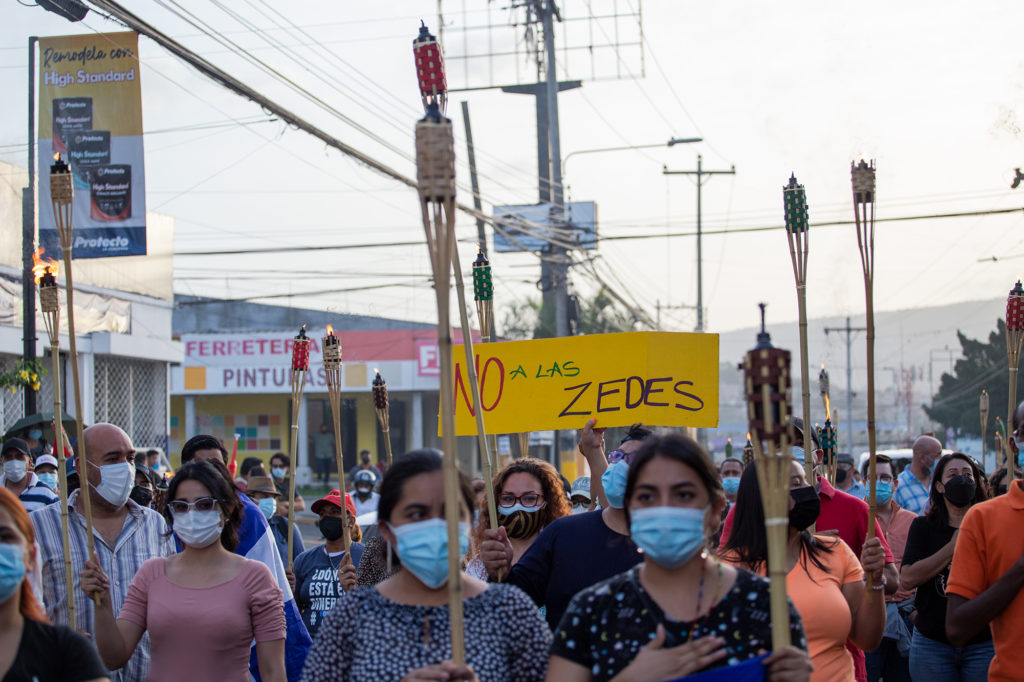
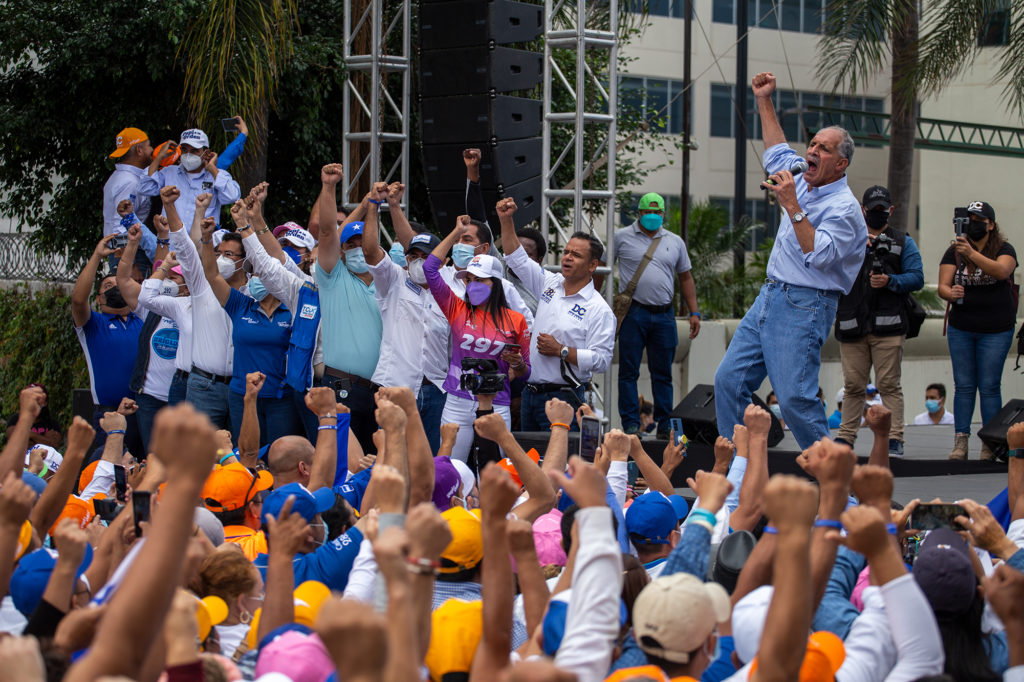
![7487 Zede Orquídea - Contra Corriente - Contra Corriente Una cuadrilla de trabajadores de Orquídea (una Zona de Empleo y Desarrollo Económico [ZEDE]) durante el montaje de las naves de producción. San Marcos de Colón, | ZEDE Honduras 2021 | ZEDES | Zonas de empleo](https://contracorriente.red/wp-content/uploads/2021/12/7487-Zede-Orquidea-1024x682.jpg)
